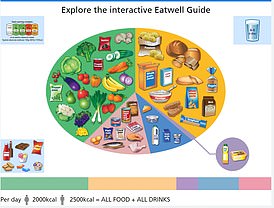I’m the gut health doctor, here are my top tips for relieving IBS symptoms
It is a painful condition that destroys the lives of millions of people.
But help is available for patients with irritable bowel syndrome (IBS).
A prominent expert nicknamed the Gut Health Doctor has revealed her top tips for easing digestive discomfort.
From eating smaller meals more often to watching your caffeine intake, registered dietitian nutritionist Dr. Megan Rossi explains how to manage your sensitive stomach…
Dr. Megan Rossi explains how to manage your sensitive stomach
Smaller, more frequent meals
Eating larger meals can trigger IBS symptoms due to the sheer amount of food the intestines then have to process at once.
Dr. Rossi said one way to avoid this problem is to change how much and how often you eat.
“I think a lot of people think they need to have three main meals, but if you have very sensitive and overactive intestines, stretching your stomach can actually cause more symptoms,” she said.
‘So instead of your three main meals, have five to six meals. You eat the same amount of food as you distribute throughout the day.’
Watch your caffeine intake
Research shows that up to a third of people with IBS experience recurring symptoms – often diarrhea – after ingesting caffeine.
Dr. Rossi advised people with IBS to not only avoid obvious caffeine-rich foods and drinks like coffee, but also to be aware of hidden sources of caffeine.
“Caffeine is not only found in tea and coffee, but some herbal teas, green tea, dark chocolate and even some cold and flu medications contain caffeine,” she said.
‘What caffeine can do is change your bowel movements and that can cause some pain if you have sensitive bowels and altered poo.
“In those types of scenarios, go decaffeinated.”
Change the type and amount of fiber you consume
Fiber is part of plant foods, such as fruits and vegetables, that can withstand normal digestion in the small intestine.
In the large intestine, it increases the volume of the stool, helping it pass through the final stages of the digestive process and making it softer and easier to pass.
Eating plenty of fiber is also linked to numerous other health benefits, including a lower risk of heart disease, stroke, type 2 diabetes and colon cancer.
Dr. Rossi said that while fiber is helpful, the way IBS is affected is also important.
“We know that fiber comes from plant foods, so it’s definitely important to include this, but I think some people are getting too much fruit and fiber at one time,” she said.
‘In that scenario I would say: try to eat some fruit, but take one piece, so about 80 grams of fresh fruit at a time.
‘Have fresh fruit three times a day, but don’t eat a very large bowl of strawberries, because they contain too much fructose, which can damage your intestines.’
Good sources of fiber include starchy foods such as oats and whole grains, beans and legumes, vegetables, fruits, nuts and seeds.
Hydration
It’s important that we all drink enough, about six to eight glasses a day according to the NHS.
But it can be crucial for IBS patients.
Those who suffer from diarrhea, where stools are watery and frequent, should ensure they maintain their fluid intake so they do not become dehydrated.
And those who suffer from constipation should also make sure they drink enough fluids.
Dr. Rossi said fiber, a part of our diet that eases bowel movements, works best when it can absorb water, so people should make sure they drink enough fluids to get the most benefit from it.
“I know it sounds very simple, but I think a lot of people don’t get enough fluid and therefore the fiber doesn’t work as effectively,” she says.
‘For fiber to have a relaxing effect on your body you need adequate hydration, so try to get enough fluid as that is very important.’

